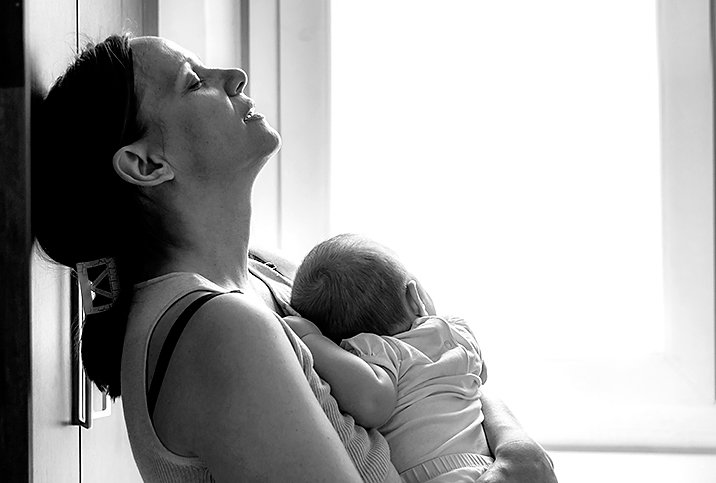Finding Yourself Again After Childbirth

In the Netflix film "Look Both Ways," Natalie Bennett (played by Lili Reinhart) goes through a challenging emotional process after becoming pregnant as she's finishing college.
The film showcases how her identity is affected by becoming a mother, something to which many women can relate. Women can be happy about motherhood and also experience a range of mixed emotions, reflecting the physical, emotional, hormonal, psychological and social changes they're going through.
"Pregnancy is a period of time in which not only is a new life developing, but also…a major life crisis for the mother in the sense of change," said Jessica Rodríguez Czaplicki, a perinatal psychologist in Pontevedra, Spain. "These changes help a woman build her maternal identity and prepare for motherhood."
How can women find balance with these mixed feelings, embrace motherhood and not lose sight of who they were before, all at the same time? We spoke to experts for their thoughts on navigating your new role while retaining your sense of self.
Mixed feelings about motherhood
Many factors influence the emotional experience of pregnancy. According to a 2013 study published in the Journal of Clinical Medicine Research, these factors include:
- The age and health of a woman
- Her psychological preparedness for maternity
- Partnership status and social relationships
- Material conditions
However, emotional ups and downs are normal no matter a pregnant woman's circumstances.
It's common for pregnant women to experience joy, fear, anxiety, stress, fatigue and excitement in equal measure. During this period, a woman may be happy about the arrival of her baby. At the same time, she may feel conflicted by the idea of losing her individuality and previous lifestyle.
"Mixed feelings—what we in psychiatry call ambivalence—are absolutely normal in pregnancy and the postpartum period. Women are going through such an extreme transition, not only physically, but also within the context of their relationships, identity and, for some, their professional lives as well," said Jennifer Reid, M.D., a psychiatrist and writer in Philadelphia who also hosts "The Reflective Doc" podcast.
Mourning the loss of the old you
Major life transitions bring a lot of feelings, rumination and sometimes grief. A sense of loss about your identity may follow childbirth, as you adjust to having someone else depend on you and all the changes that brings.
In the film "Look Both Ways," Natalie's mother talks about a kind of grief that women go through. Natalie is happy about giving birth to her daughter, but she feels like she doesn't have a life anymore, especially after putting her career plans on hold to raise her child. This situation creates an emotional conflict for her, made worse by the sleepless nights and hormonal changes.
"There's this thing that happens when you get pregnant. No one talks about this. But you…you mourn a little bit," says Natalie's mother, Tina (played by Andrea Savage), in the film. "You mourn, you know, the person that you used to be. Because the fact is, no matter how much you want to be a mom, you're never not going to be one again…that is a huge brain adjustment. You are letting go of your old self."
These feelings of grief and loss can happen to anyone.
"For example, even though a baby may be deeply desired, a woman can still feel a sense of loss as she navigates life with an infant, missing the freedom to take an afternoon walk without a lengthy checklist of gear and close adherence to nap schedules," Reid explained. "She may feel left out during her time away from the office, hearing snippets from colleagues and worrying she may be left behind during her maternity leave."
Finding yourself again
Making adjustments sometimes seems like a steep hill to climb, but you can reconcile or rediscover yourself after pregnancy. However, it's not a race. Everyone is different. You should take your time and put aside thoughts of what's "right" or "perfect."
"The main thing is we women become aware that motherhood changes us, and it changes us on many levels and in many spheres of our lives. We are still ourselves, but now we are mothers," Rodríguez Czaplicki said.
It is essential not to surrender to social and personal pressures about being the same as before physically, socially and professionally.
"The body will take time, the baby's demands are high and the mother's personal self-care is basic," Rodríguez Czaplicki continued.
"Expecting to feel only positive emotions can lead to guilt, shame and isolation," Reid added. For that reason, it's important to experience the full range of emotions during pregnancy and the postpartum period. "I encourage the women in my practice to utilize self-compassion as they adjust to each change [and] recognize the profound role their bodies are playing in growing a new human."
These mental health professionals advise their pregnant patients to give themselves time, because the emotional postpartum period usually outlasts the physical period, depending on the mother and baby.
In the process of rediscovering yourself, keep a few tips in mind:
- Don't judge yourself
- Accept support
- Talk honestly about what is happening to you
- Have space to take care of yourself
- Don't rush to return to roles as a partner, friend or professional; it will take time, but you will get there
- Avoid unrealistic demands
- Reconnect with activities you enjoyed before childbirth
- Try to avoid comparisons to unrealistic beauty ideals
- Recognize the essential role you have
- Most importantly, be aware of the warning signs for postpartum depression, such as intense guilt, lack of pleasure or a drop in appetite
Be open about the realities
Motherhood is the dream of many women, but it's OK to admit if it sometimes feels more like a nightmare.
"Our culture has tended to idealize motherhood, and the media has also contributed to that," Rodríguez Czaplicki said. "We must escape from the idea of the mother who always smiles, who is always perfect, and talk realistically about everything it involves: the many joys of being a mother, but also the difficulties."
This subject shouldn't be taboo to talk about, Rodríguez Czaplicki said. Being open about the realities allows women to eliminate guilt or shame, she said.
You will go through emotional, social and family demands during pregnancy and the postpartum period. Those changes you feel—and sometimes can't process—are common for many mothers. It is OK to ask for help from friends, family members or a mental health professional, who can help you navigate your new role of motherhood without losing yourself.




















